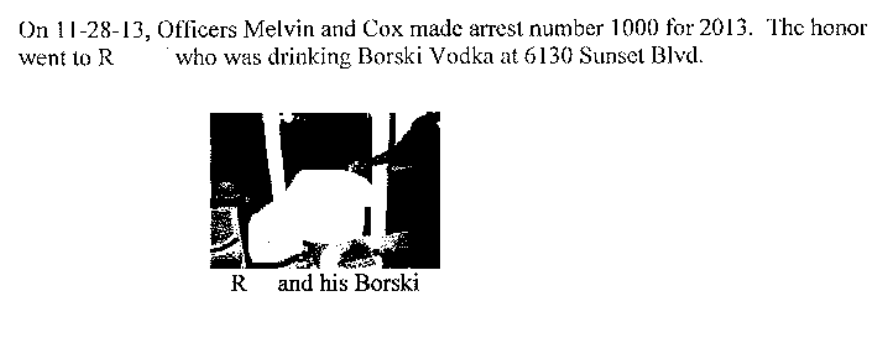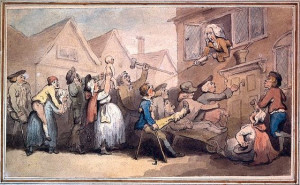
Continue reading Steve Seyler, Hitherto Unknown Poet Laureate of the Boulevard of Broken Dreams


The Berlin Wall image is public domain and available here from the lovely openclipart.org.

Anyway, Seyler’s bête noire is something called Taaka Vodka. He has effectively criminalized its possession in the BID-occupied areas of Hollywood:1
He’s also obsessed with a brand of vodka called Borski, to the point where he seems overjoyed that it was involved in the BID patrol’s thousandth arrest of 2013:3

Seyler has, like the guy whose hat graces his head in the satirical picture above, evidently inspired his officers to form a mystical cult whose rituals include some kind of idolatry involving Taaka:2
Continue reading Steve Seyler, Vodka Nazi

Seyler is, of course, speaking to his bosses, so he has to make sure they understand what they’re getting for their money. And what are they getting?
Continue reading Sidewalk With BID Patrol

Each member of a legislative body who attends a meeting of that legislative body where action is taken in violation of any provision of this chapter, and where the member intends to deprive the public of information to which the member knows or has reason to know the public is entitled under this chapter, is guilty of a misdemeanor.
Now, that intent element is a little sticky. Evidently it’s not a crime “to deprive the public of information” if you’re just ignorant of the law or too arrogant to understand that the law applies to you or whatever. But at least some members of some groups subject to the Brown Act must be guilty of a misdemeanor when, e.g., they explicitly deny members of the public access to documents which the Brown Act states explicitly must be made available to the public “immediately.” When a member of a body subject to the Brown Act says “no, you can’t look at the document,” the intent is clear. The member “has reason to know” the law because it’s their job to know the law, them being a member of a Brown-Act body. Bang! Misdemeanor. Then how does the law get enforced in such a case?
The procedure is laid out in the Act itself (§54960 et seq.). Either the DA or a member of the public can go to court and ask for injunctive relief of various kinds or else “any interested party” can write a letter to the criminals, point out their crime, give them 30 days to think about it, and allow them the option of promising never to do the crime in the future albeit without admitting that they actually did it in the past. As far as we can see, no one has ever gone to jail for violating the Brown Act (although see this story about a guy in Illinois who placed a whole county board of supervisors under citizen’s arrest).
Continue reading How to Enforce the Law
Here’s a video, taken by a correspondent of ours on Friday, October 3, 2014:
He wrote to Captain John Irigoyen of Universal Protective Services, which the Hollywood Media District BID pays to run its safety patrol, asking for their names. Irigoyen asked why our correspondent was asking, and got the following response:
Continue reading Hollywood BID safety patrol guys hassle a harmless man on the street